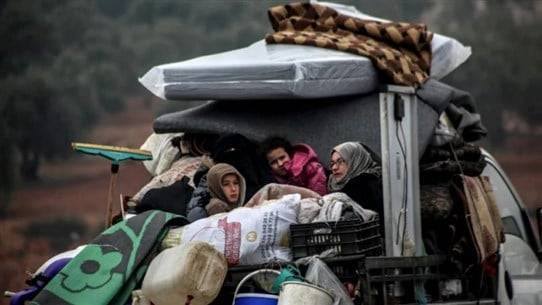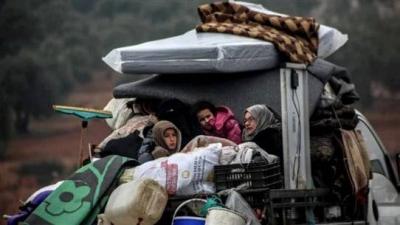A "convoy" of displaced Syrians is expected to leave for Syria within days after the General Directorate of General Security finalized logistic arrangements with the Syrian side. Despite international obstacles, Lebanon hopes that the return of around two thousand displaced people will open the door for an increase in requests for voluntary return. The international community has not imposed a "veto" on the return of Syrian displaced persons to their country, as indicated by statements from officials of international organizations, particularly the United Nations High Commissioner for Refugees (UNHCR), which announced its opposition to encouraging returns as it still considers the situation "unsafe." Some officials from other international organizations have even accused Lebanon of pushing the displaced towards "their doom" and "forcing them" into "involuntary returns."
Lisa Abu Khaled, the media affairs officer at the Commission, noted that "thousands of refugees choose to exercise their right to return every year," but she confirmed to "Al-Akhbar" that the commission "is not currently facilitating widespread voluntary returns of refugees from Lebanon to Syria," calling for "respecting the basic right of refugees to return freely and voluntarily to their country of origin at the time they choose." Despite all the international noise and visits by diplomats to Lebanese government offices to curb enthusiasm around this issue, Lebanon is working "quietly" to return to the approach that was followed more than three years ago when the General Directorate of General Security coordinated with the relevant authorities in Syria to facilitate the return of over 400,000 refugees in batches, after providing Lebanese facilitation and direct sponsorship for their return until they reached their villages in coordination with Damascus.
Therefore, General Security Director Abbas Ibrahim has been officially tasked with revitalizing the file again, following Minister of Displaced Persons Issam Sharaf al-Din's visit to Damascus a few months ago, where he obtained an official document detailing the facilities that the Syrian state could provide for returnees, such as providing housing for those whose homes were destroyed, postponing compulsory military service for six months, benefiting from the general amnesty recently issued by President Bashar al-Assad, and securing jobs or reinstating some in public sector jobs.
The General Directorate of General Security has continued what Sharaf al-Din started by receiving requests from Syrian displaced persons wishing to return, with the number reaching about two thousand, most of whom are residing in the town of Arsal and its surroundings. This number will be part of the first batches that will be secured for return to their country within days. "Al-Akhbar" learned that 1,600 families submitted requests for "the desire" to return to Syria in 17 General Security centers recently opened across Lebanese territory to receive these requests, including 483 families currently residing in Arsal. Observers link the small number to the enrollment of Syrian students in Lebanese schools and to external hindrances and pressures on the displaced. Additionally, some who submitted return requests may not be serious, merely ensuring that their security record is clean, while previous experiences indicated that some change their minds at the last minute.
In any case, the list of the 2,000 names sent to the Syrian side might serve as a "test balloon" for the international community's reaction. The General Security is counting on the successful departure of the convoy and the stability of returnees in their neighborhoods to encourage others to submit requests for voluntary return.
### Logistic Details
According to "Al-Akhbar," Syrian security has finished reviewing the names, and the first batch of convoys is expected to depart on Wednesday, with additional convoys to follow in days, weather permitting. The convoy departing from Arsal will head to the western Qalamoun region via the Zamarani crossing, according to Rana Ramadan, the legal coordinator at the Lebanese Ministry of Displaced Persons in Arsal.
Ramadan pointed out to "Al-Akhbar" that around a thousand people (half the number of those listed in the first batch) have been notified by General Security that they can return on Wednesday, with the assembly point being in Wadi Hamid at six in the morning. She clarified that the first batch will be completed in the following days, although the exact timing has not been determined, and General Security will notify the families approved for departure after organizing the first trip.
The main obstacle looming on the horizon is that General Security has not adopted the method it used three years ago in notifying whomever was approved regarding crossing the Lebanese-Syrian border. Instead, the new format is "more transparent," implying that the security agency will notify displaced individuals that they have a security-judicial pursuit, without specifying the details. This may justify why some changed their minds about returning upon learning of this. While the number of those with security or judicial pursuits is not large, it affects their families, as these individuals refuse for their wives and children to return while they remain in Lebanon.
"Al-Akhbar" learned that Ibrahim agreed with the Syrian side on the details of simple logistical arrangements or those that could pose obstacles. He also obtained official commitments from the Syrian side regarding the provided facilitates, including delaying returnees from compulsory military service for six months. Moreover, the Syrians sent pictures of newly built housing centers. It was agreed that the Syrian and Lebanese authorities would exempt returnees from customs fees on belongings such as mobile phones, solar panel equipment, household items, and livestock, with some procedures regarding other matters, such as vehicles. Displaced persons wishing to return in their cars must possess legal documents for the vehicles in Lebanon or Syria.
General Security is also coordinating with international organizations and Western diplomats. For this purpose, Ibrahim recently welcomed ambassadors and representatives from Germany, Belgium, Switzerland, the Netherlands, Sweden, and the Czech Republic to discuss "the issue of the voluntary return of Syrian displaced persons," according to the statement disseminated by General Security. Thus, it will be natural for some officials from international organizations to accompany the returning convoys as was done previously, when they would follow each returnee to the border, asking numerous questions about whether they were returning voluntarily.
Abu Khaled clarified that "according to the protection mission and in application of its procedures, the Commission will participate in interviews with refugees before the voluntary return and will be present at the departure points, as was the procedure followed previously before these trips were suspended due to COVID-19." A security source indicated that after completing the security and judicial arrangements preceding the first batch's departure, General Security is currently working on gathering return requests arriving at the designated centers across various regions (17 centers) to begin preparing the second batch, which has not yet been assigned a number.




